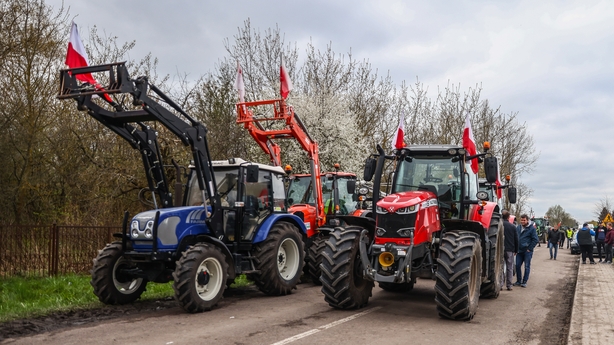European Commission president Ursula von der Leyen proposed an extra €100 million of support for EU farmers to ease a standoff over Ukrainian grain.
Brussels is scrambling to find a solution after Poland, Hungary, Slovakia and Bulgaria banned imports of Ukrainian grain and other food products, blaming them for driving down prices.
Ukraine's grain exports have been transiting through the European Union to other countries since the war-torn nation's traditional Black Sea routes were cut by Russia's invasion.
But, because of logistical issues, the grain had been piling up and pushing prices lower, triggering protests from local farmers, who also raised food safety concerns.
Ms Von der Leyen put forward a new €100 million package for the hardest hit farmers in a letter to five eastern European leaders.
That money would come on top of a €56 million package that was provided for farmers in Poland, Romania and Bulgaria last month.
Ms Von der Leyen also vowed "preventive measures" to improve the situation in regard to certain grains such as wheat, maize, sunflower and rapeseed.
An EU official said the measures would be aimed at ensuring grain could enter Poland, Slovakia, Hungary, Romania and Bulgaria only for export.

Yesterday, Warsaw struck a deal with Kyiv to allow Ukrainian grain to transit again through Poland.
Polish Agriculture Minister Robert Telus said "mechanisms" had been put in place to make sure no grain would remain in his country.
Hungary widened its temporary ban to cover products such as honey, wine, bread and sugar, but said it did not apply to the transit of products through the country.
Brussels had previously insisted that any unilateral bans on the Ukrainian exports were "not acceptable" and noted that trade policy is solely an EU responsibility.
EU trade commissioner Valdis Dombrovskis is set to meet with representatives from the five concerned member states and Ukraine to discuss the proposals.
The EU standoff has come as tensions over a deal with Russia to allow grain out of Ukraine via the Black Sea has again fuelled fears for exports.

